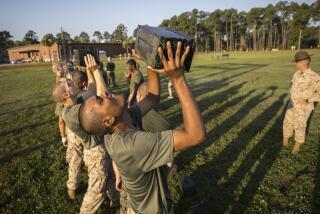Defense chief Gates orders review of Marines’ role
- Share via
Reporting from San Francisco — Defense Secretary Robert M. Gates is ordering a review of the future role of the Marine Corps amid “ anxiety” that the wars in Iraq and Afghanistan had turned the service into a “second land army.”
The review would seek to define a 21st century combat mission for the Marines that is distinct from the Army’s, because the Marines “do not want to be, nor does America need” another ground combat force, Gates said in prepared remarks for a speech at Marines’ Memorial Theatre in San Francisco on Thursday to a group that included retired Marines and foreign policy experts.
Gates is on a two-day trip to California. He met with sailors onboard the destroyer Higgins on Thursday and plans to attend a training ceremony for Navy Seals on Friday.
In ordering the Pentagon review, Gates was deepening a long-running debate about the role of the Marine Corps, including whether one of its main missions — amphibious assaults against fortified coastlines — has become obsolete because of the changing nature of warfare and advances in precision weaponry.
Gates is seeking $100 billion in budget savings from the military services and Pentagon bureaucracies, though he intends to invest the money in weapons programs. Given the unwavering support for the Marines in Congress, there is little chance the service would be eliminated or see its budget significantly reduced.
Gates noted that anxiety about the future of the Marines stems from the “perception … that they have become too heavy, too removed from their expeditionary roots.”
In a question-and-answer session with sailors aboard the Higgins earlier in the day, Gates said, “I think they’ve gotten too big,” and he predicted that the service would shrink in coming years.
Such statements only intensify worries among serving and retired Marines about the future. But Gates sought to reassure his audience that he continued to see a major future role for the service.
The review will be conducted by Gen. James F. Amos, the incoming Marine commandant, and by Navy Secretary Ray Mabus. The Marines are a component of the Navy Department.
The review, Gates said, would make recommendations about what “expeditionary forces in readiness would look like.” It “should not lose sight of the Marines’ greatest strengths,” he said, including “a broad portfolio of capabilities” and its adaptability.
“The Marines’ unique ability to project combat capability from the sea under uncertain conditions — forces quickly able to protect and sustain themselves — is a capability that America has needed in this past decade and will require in the future,” he added.
Like all the services, the Marine Corps has been forced in Iraq and Afghanistan to undertake counterinsurgency warfare, experiences that Gates said “well position” the Corps for the types of wars the U.S. is likely to face in the near future.
But as the demands on the Marines have grown, so have its size and its approach to warfare.
Marines have found themselves in long, difficult deployments in the toughest parts of Iraq and Afghanistan. The number of Marines has grown from 175,000 to more than 200,000, another departure from its historical role as a small, elite force trained to move quickly and strike hard. There are currently 20,000 Marines in Afghanistan’s Helmand province.
Gates said he did not want to preempt the review’s findings, but he noted that “it is proper to ask whether large-scale amphibious assault landings” are feasible because advances in anti-ship missiles would require troop-carrying ships to remain “25, 40 or even 60 miles” away from shore.
david.cloud@latimes.com
More to Read
Sign up for Essential California
The most important California stories and recommendations in your inbox every morning.
You may occasionally receive promotional content from the Los Angeles Times.











